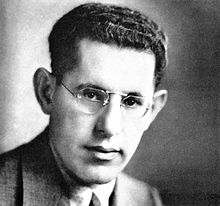Sol M. Wurtzel
Solomon Max Wurtzel (born September 12, 1890 in New York City , United States , † April 9, 1958 in Los Angeles , California ) was an American film producer, an extremely prolific producer of B-Pictures and series films.
Live and act
The son of German-Jewish immigrants made his first film contacts through William Fox , the founder of the Fox Film Corporation . Fox initially hired Wurtzel as a stenographer and later made him his secretary. At that time, Fox, who was still mainly active on the US east coast with his company, sent Wurtzel to California in 1917 to oversee the studio operations there in the blossoming Hollywood . Shortly after the end of the First World War, Wurtzel took over the studio production, but did not work regularly as a producer until the end of the silent film era.
In the mid-1930s he had a lucky hand several times when he produced the cash-laden heart warmer Laughing Eyes with Shirley Temple , then produced John Ford , who had just become famous with the IRA drama The Traitor , in his subsidiary work Full Steam Ahead and in two films ( Charlie Chan in Egypt and The Ship of Satan ) launched the career of the hitherto completely unknown Rita Casino (later Rita Hayworth ).
For around two decades, throughout the 1930s and years, Wurtzel threw hundreds of mostly cheap films onto the US market. Especially towards the end of the 1930s, Wurtzel achieved success when he brought several stories about the East Asian noses Charlie Chan (played by Warner Oland ) and Mr. Moto (played by Peter Lorre ) into the cinemas. At the beginning of the 1940s, Wurtzel also produced some old-age comedies with the once successful comedian duo Laurel & Hardy . At the same time, during the Second World War , Wurtzel also produced several propaganda films such as Manila Calling, Secret Agent of Japan, Chetniks and Bomber's Moon .
None of Wurtzel's almost two hundred productions were particularly substantial, let alone any of these films has any film-historical significance. Nonetheless, this mass-produced product enjoyed considerable popularity among the poor. His film career ended in 1949, and Sol M. Wurtzel suffered a stroke three years later .
Movies
as a line producer or film producer
- 1919: The Coming of the Law
- 1926: Rustling for Cupid
- 1927: Happiness in the Attic ( Seventh Heaven )
- 1929: Fox Movietone Follies of 1929
- 1929: Sunnyside Up
- 1931: Young as You Feel
- 1931: The Cisco Kid
- 1932: Mystery Ranch
- 1933: Walking Down Broadway
- 1933: Walls of Gold
- 1934: Murder in Trinidad
- 1934: Handy Andy
- 1934: Pursued
- 1934: Jungle Priest
- 1934: Laughing Eyes ( Bright Eyes )
- 1935: Charlie Chan in Paris
- 1935: Charlie Chan in Egypt ( Charlie Chan in Egypt )
- 1935: The Ship of Satan ( Dante's Inferno )
- 1935: Full steam ahead ( Steamboat Round the Bend )
- 1936: Charlie Chan's Secret ( Charlie Chan's Secret )
- 1936: Dangerous cargo ( human cargo )
- 1936: hands up! ( The Country Beyond )
- 1936: Ramona
- 1936: Charlie Chan at the Opera ( Charlie Chan at the Opera )
- 1937: Charlie Chan in Monte Carlo ( Charlie Chan at Monte Carlo )
- 1937: Mr. Moto and the Smugglers' Gang ( Think Fast, Mr. Moto )
- 1937: Mr. Moto and the China Treasure ( Thank You, Mr. Moto )
- 1938: Mr. Moto and the Gamble ( Mr. Moto's Gamble )
- 1938: Mr. Moto and the Jungle Prince ( Mr. Moto Takes a Chance )
- 1938: Mr. Moto and the Chandelier ( Mysterious Mr. Moto )
- 1938: Mr. Moto and the Fleet ( Mr. Moto's Last Warning )
- 1939: Mr. Moto and the Mysterious Island ( Mr. Moto in Danger Island )
- 1939: Mr. Moto and his decoy ( Mr. Moto Takes a Vacation )
- 1940: Charlie Chan in Panama
- 1940: Viva Cisco Kid
- 1940: Jennie
- 1940: Earthbound
- 1940: Charlie Chan: Murder Over New York ( Murder Over New York )
- 1941: Charlie Chan in Rio
- 1941: Horror of the Company ( Great Guns )
- 1941: Cadet Girl
- 1941: Private nurse
- 1942: Young America
- 1942: Manila Calling
- 1942: Secret Agent of Japan
- 1942: Dick and Doof as secret agents with the FBI ( A Haunting We Will Go )
- 1943: Chetniks
- 1943: Bomber's Moon
- 1943: Dick and Doof and the miracle pill ( Jitterbugs )
- 1944: Pin Up Girl
- 1944: The big bang ( The Big Noise )
- 1946: Rendezvous 24
- 1946: Strange Journey
- 1947: backlash
- 1947: Second Chance
- 1948: Half Past Midnight
- 1948: Fighting Back
- 1948: Night Wind
- 1949: Miss Mink of 1949
- 1949: Tucson
literature
- Ephraim Katz : The Film Encyclopedia, Fourth Edition. Revised by Fred Klein and Ronald Dean Nolen. New York 2001, p. 1483
Web links
- Obituary in The New York Times, April 10, 1958
- Sol M. Wurtzel in the Internet Movie Database (English)
| personal data | |
|---|---|
| SURNAME | Wurtzel, Sol M. |
| ALTERNATIVE NAMES | Wurtzel, Solomon Max (full name) |
| BRIEF DESCRIPTION | American film producer |
| DATE OF BIRTH | September 12, 1890 |
| PLACE OF BIRTH | New York City , United States |
| DATE OF DEATH | April 9, 1958 |
| Place of death | Los Angeles , United States |
